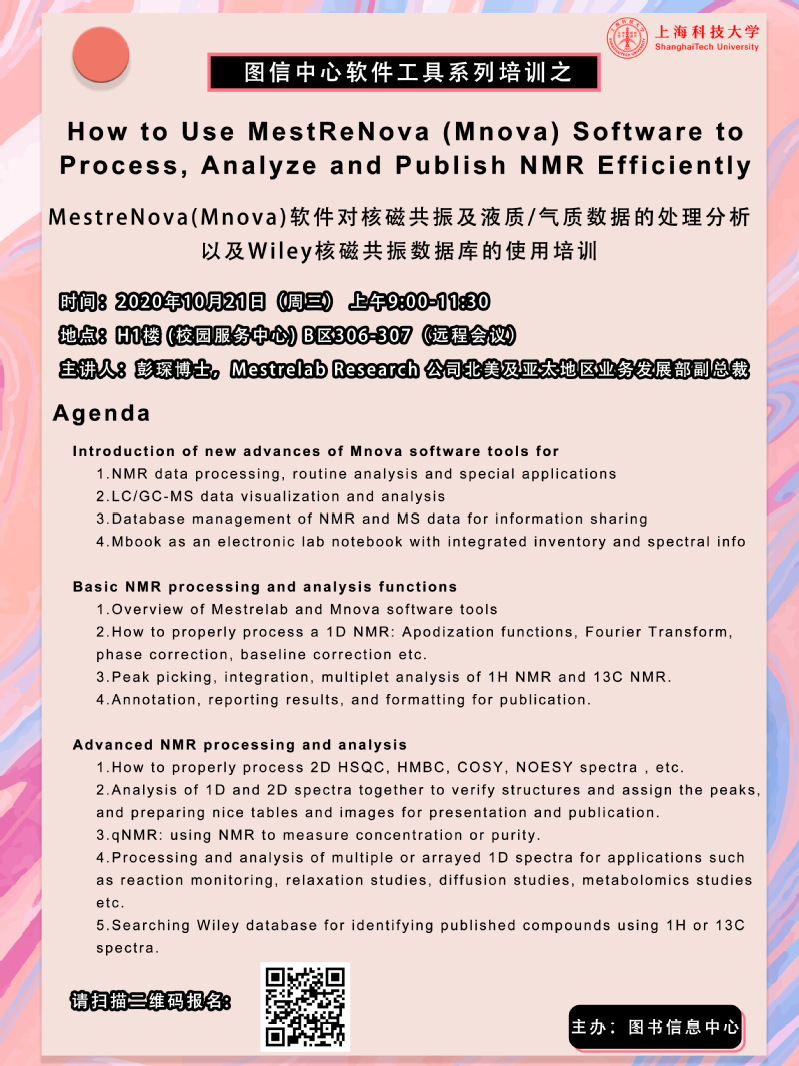时间:10月21日周三上午9:00-11:30
地点:H1楼B区校园服务中心306-307(远程会议)
主讲人:彭琛博士,Mestrelab Research 公司北美及亚太地区业务发展部副总裁
MestReNova(简称Mnova)是西班牙Mestrelab Research 公司开发的科学软件,集NMR 和LC/MS 数据处理分析、预测、发表、验证及数据的储存、检索以及管理等功能于一身,具有功能强大健全、操作简便人性化、处理结果准确美观等优势。
图书信息中心邀请到了Mestrelab 公司北美及亚太地区业务发展部副总裁彭琛博士为大家讲解《MestReNova(Mnova)软件对核磁共振及液质/气质数据的处理分析以及Wiley核磁共振数据库的使用》,欢迎大家参加扫描下方二维码报名参加:

讲师简介:
Dr. Chen Peng is the Vice President of Business Development for North America and Asia since he joined Mestrelab Research in May 2008. He got his B.Sc. in Organometallic Chemistry from Wuhan University in 1987. He obtained his PhD from the Shanghai Institute of Organic Chemistry with a dissertation work on computer-assisted structure elucidation for organic compounds and natural products using 1D and 2D NMR data. Between 2004 to 2006, he did post-doctoral research work on selective excitation NMR spectroscopy in Prof. Geoffrey Bodenhausen’s group in the National High Magnetic Field Laboratory (Tallahassee, FL) in 1994-1996. Between 1996 to 2008, he worked as software developer for NMR-analysis in Spectrum Research, Molecular Simulation Inc (Accelrys), and Bio-Rad Informatics before joining Mestrelab Research. He has done presentation and training of Mnova to many academic institutions, including Harvard, MIT, Stanford, Scripps Research Institute, NIH/NCI and NCATS etc. He also enjoys writing Mnova scripts for customers with special needs, and some of those scripts were further developed to Mnova plugins such as Mnova qNMR (for concentration and purity determination) and Screen (for NMR-based protein-ligand binding screening).
Agenda
Introduction of new advances of Mnova software tools for
1.NMR data processing, routine analysis and special applications
2.LC/GC-MS data visualization and analysis
3.Database management of NMR and MS data for information sharing
4.Mbook as an electronic lab notebook with integrated inventory and spectral info
Basic NMR processing and analysis functions
1.Overview of Mestrelab and Mnova software tools
2.How to properly process a 1D NMR: Apodization functions, Fourier Transform, phase correction, baseline correction etc.
3.Peak picking, integration, multiplet analysis of 1H NMR and 13C NMR.
4.Annotation, reporting results, and formatting for publication.
Advanced NMR processing and analysis
1.How to properly process 2D HSQC, HMBC, COSY, NOESY spectra , etc.
2.Analysis of 1D and 2D spectra together to verify structures and assign the peaks, and preparing nice tables and images for presentation and publication.
3.qNMR: using NMR to measure concentration or purity.
4.Processing and analysis of multiple or arrayed 1D spectra for applications such as reaction monitoring, relaxation studies, diffusion studies, metabolomics studies etc.
5.Searching Wiley database for identifying published compounds using 1H or 13C spectra.


